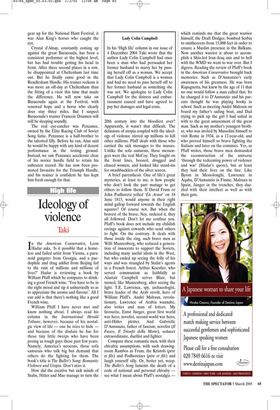Ideology of violence
Taki
In the American Conservative, Leon Hadar asks, ‘Is it possible that a homeless and failed artist from Vienna, a paranoid gangster from Georgia, and a paedophile and drug addict from Beijing led to the ruin of millions and millions of lives?’ Hadar is reviewing a book by William Pfaff which he compares to drinking a good French wine. ‘You have to be in the right mood and sip it unhurriedly so as to appreciate the aroma and flavour.’ All I can add is that there’s nothing like a good French wine.
William Pfaff I have never met and know nothing about. I always read his column in the International Herald Tribune, however, because of his nostalgic view of life — one he tries to hide and because of the disdain he has for those tiny little twerps who have been posing as tough guys these past few years. Namely, America’s neocons, those sofa samurais who talk big but demand that others do the fighting for them. The book’s title is The Bullet’s Song: Romantic Violence and Utopia. Don’t miss it.
How did the creative but sick minds of Stalin, Hitler and Mao manage to turn the 20th century into the bloodiest ever? Apparently, it wasn’t that difficult. The delusions of utopia coupled with the ideology of violence stirred up millions to kill other millions. Pfaff deals with those who carried the sick messages to the masses. Unlike the sofa samurais, these messengers were the real McCoy. They fought on the front lines, boozed, drugged and chased women, and looked like stand-ins for swashbucklers of the silver screen.
A brief parenthesis. One of life’s great mysteries, at least to me, is how people who don’t look the part manage to get others to follow them. If David Frum or John Podhoretz yelled ‘En Avant’ on 18 June 1815, would anyone in their right mind gallop forward towards the English squares? Of course not. But when the bravest of the brave, Ney, ordered it, they all followed. Don’t let me confuse you. Pfaff’s book does not include my childish ravings against cowards who send others to fight. On the contrary. It deals with those inside the ring, such brave men as Willi Munzenberg, who seduced a generation of innocents to support the Soviets, including many useful idiots in the West, but who ended up seeing the folly of his ways and was strangled by Stalin’s agents in a French forest. Arthur Koestler, who served communism as faithfully as Alastair Campbell serves Blair, but turned, like Munzenberg, after seeing the light. T.E. Lawrence, spy, archaeologist, brave leader of the Arab revolt, hero of William Pfaff’s. André Malraux, revolutionary, Lawrence of Arabia wannabe, also writer and man of letters. My favourite, Ernst Jünger, great first world war hero, novelist, second world war hero, anti-Hitler plotter. And Gabrielle D’Annunzio, father of fascism, novelist (Il Fuoco, Il Trionfo della Morte), seducer extraordinaire, duellist and fighter.
Compare these romantic men, with their chivalric assumptions, with such drawingroom Rambos as Frum, the Kristols (père et fils) and Podhoretzes (père et fils) and laugh yourself silly. Or, better yet, weep. The Bullet’s Song laments the death of a code of national and personal chivalry see what I mean about Pfaff’s nostalgia — which reminds me that the great warrior himself, the Draft Dodger, bombed Serbia to smithereens from 15,000 feet in order to ensure a Muslim presence in the Balkans. Now another warrior is about to accomplish a Shia-led Iran–Iraq axis and to hell with the WMD we went to war over. But I digress. Reading the review of Pfaff’s book in the American Conservative brought back memories. Such as D’Annunzio’s early awareness of his greatness. He was born Rapagnetta, but knew by the age of 11 that no one would follow a man called that. So he changed it to D’Annunzio and his parents thought he was playing hooky in school. Such as meeting André Malraux on board my father’s sailing boat, and Dad trying to pick up the girl I had sailed in with to the great amusement of the great man. Such as my mother’s youngest brother, who was invited by Mussolini himself to visit Rome in 1934, as a 12-year-old, and who proved himself so brave fighting the Italians and later on the commies. Yes, as Pfaff writes, those brave men demanded the reconstruction of the universe ‘through the redeeming power of violence and war’ (Hadar’s quote), but at least they laid their lives on the line. Like Byron in Messolonghi, Lawrence in Aqaba, D’Annunzio in Fiume, Malraux in Spain, Jünger in the trenches, they dazzled with their intellect as well as with their guts.


























































 Previous page
Previous page